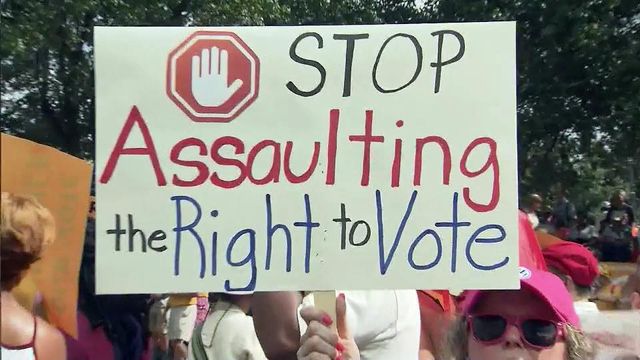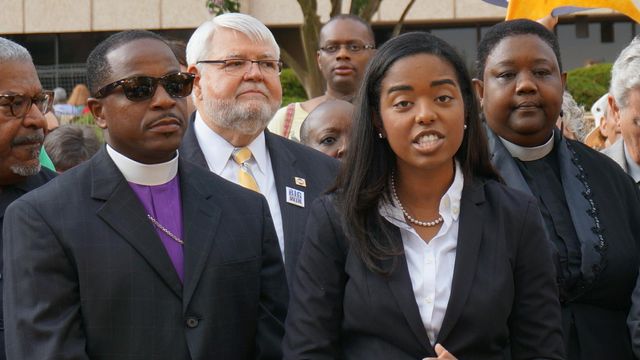NC voting law on trial in Winston-Salem
Lawyers and witnesses focused on whether Republican North Carolina state lawmakers and GOP Gov. Pat McCrory illegally weakened minority voting strength, as a federal voting rights trial challenging a 2013 state law began Monday.
Posted — UpdatedThe trial in Winston-Salem stems from three federal lawsuits filed by the U.S. Justice Department, state NAACP and others over provisions that scaled back early voting and prevented the counting of Election Day ballots cast in an incorrect precinct.
Election law experts say the case could determine how far Southern states can change voting rules after the nation's highest court struck down a portion of the federal Voting Rights Act just weeks before the North Carolina law was passed.
Hundreds of people waiting in line for more than an hour Monday morning for a chance to sit in on the trial, but many were turned away once the courtroom reached capacity.
Here are highlights from the trial's first day and expected upcoming points of contention:
___
OPENING ARGUMENTS
Attorneys for the U.S. government and state NAACP said they would prove state lawmakers deliberately suppressed voting rights for minority groups. The Rev. William Barber, president of the state NAACP chapter, has repeatedly likened the elections overhaul trial to a confrontation in 1965 in Selma, Ala., between voter registration workers and local police who used violence to subdue them.
The plaintiffs believe the trial "will have a lasting and decisive impact on the voting rights of African Americans and Latinos in North Carolina, and an impact on the Voting Rights Act itself," said Penda Hair, a lawyer representing the NAACP. "That is why they say about this case: 'This is our Selma.'"
Tom Farr, a private attorney representing the state, said in court he was taken aback by the Selma connection given the challenged provisions are the law in a majority of the 50 states.
"What is the dastardly thing that North Carolina has done that has been equated to the events in Selma?" Farr asked. He pointed out that black turnout increased in the 2014 election – when some provisions were implemented – compared to four years earlier. "I think it's hard to say that's purposeful discrimination."
Before the trial opened, Jamie Cole, legal and public policy director for the state NAACP, said the intent of the law has been clear from the beginning.
"Lawmakers were presented with significant evidence that the measure would make it harder for African-American voters to participate in the electoral process, but passed it anyway," Cole said at a news conference.
Supporters of the law countered that it is simply a way to combat voter fraud.
"These are common-sense protections that will make it harder to cheat in our elections," said Ricky Diaz, a spokesman for the North Carolina Republican Party.
Lawyers for the state pointed out that other states have similar election laws, adding that North Carolina's rules give everyone has the same opportunity to vote.
___
EARLY WITNESSES
Gwendolyn Farrington of Durham testified her vote didn't count last November when she went to the precinct site closest to her job. The 2013 law prohibited out-of-precinct ballots on Election Day from being counted. Farrington she had to pick up her sons that day after getting off work at 6 p.m. Polls close at 7:30 p.m. and she said she couldn't have made it to her home precinct in time.
"I was raised that voting was important," Farrington said. "You cannot get your voice heard unless you exercise your right to vote."
During a videotaped deposition by another woman whose out-of-precinct ballot didn't count, Farr suggested the woman had other transportation options to reach the correct precinct, including one from her church.
Barber testified late Monday afternoon, and outside the courthouse, he described the election law changes as the worst act of voter suppression he's ever seen.
"The subject is equality. The subject is democracy. The subject is the soul of this country," he said.
___
OTHER CONFLICTS
The trial also is expected to address whether the rights of black and Latino voters were abridged when lawmakers reduced the number of early voting days before Election Day and the primary from 17 to 10 and eliminated the ability to register to vote and cast a ballot on the same day during the early voting period. Another challenged provision eliminated a program allowing 16- and 17-year-olds to "preregister" to vote so they would be automatically registered at 18.
U.S. District Judge Thomas Schroeder refused last year to delay the use of these provisions in last November's election as the trial neared.
___
WHAT'S NEXT:
The NAACP and other advocacy groups held a mass rally in downtown Winston-Salem on Monday evening, attracting hundreds of people.
"It's not a privilege for a few people to have," rally participant John Jordan said of voting. "It's for everyone, and everybody's voice is important."
"For so many years, North Carolina was the progressive state in the South, making a lot of progress, becoming free and democratic. Now, I just feel like we're sliding back so quickly," rally participant Wayde Marsh said.
The trial is expected to last up to four weeks. Schroeder isn't expected to rule right away. For now, he has set aside a legal fight over North Carolina's photo identification requirement to vote in person in 2016 because lawmakers last month eased the mandate. Schroeder's final ruling likely will be appealed and could reach the Supreme Court.
• Credits
Copyright 2024 by WRAL.com and the Associated Press. All rights reserved. This material may not be published, broadcast, rewritten or redistributed.






